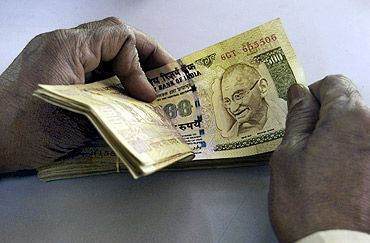 Under the scheme coming into effect from April 1, 2018, a donor could purchase bonds from authorised banks against cheques or digital payments. These would be redeemed only in the designated account of a registered political party.
Under the scheme coming into effect from April 1, 2018, a donor could purchase bonds from authorised banks against cheques or digital payments. These would be redeemed only in the designated account of a registered political party.
A government source said additional precautionary measures would be put in place to ensure anonymity of the donor. The bonds are also likely to reduce internal corruption within political parties, which get a lot of donations in cash and is usually collected by second- or third-rung leaders.
The finance ministry could suggest a 30-day window for political parties to redeem the proposed RBI electoral bonds to prevent misuse.
Measures aimed at reducing black, or unaccounted, money in political funding were one of the highlight of Budget 2017-18 that Finance Minister Arun Jaitley presented last Wednesday.
In his Budget speech, Jaitley had said the government would soon frame rules on electoral bonds.
Ever since, leaders of political parties have been seeking details of the proposal. On Friday, Trinamool Congress Rajya Sabha member Derek O’Brien was one of those who wanted to know from the FM the modalities likely to govern electoral bonds. Congress Vice-President Rahul Gandhi had welcomed the move on Wednesday.
According to sources, Congress treasurer Motilal Vora supported the government’s move on electoral bonds. Trinamool’s rival in Bengal, the Communist Party of India-Marxist, has criticised it for falling way short of any real reform.
In his Budget speech, Jaitley had said: “These bonds will be redeemable within the prescribed time limit from issuance of bond. But he didn't specify the window. A top finance ministry source said on Friday the rules were likely to provide a window of 30 days or less for redeeming of the bonds. Such bonds were earlier known to have been misused.
Under the new scheme to come into effect from April 1, 2018, a donor could purchase bonds from authorised banks against cheques or digital payments. These would be redeemed only in the designated account of a registered political party.
For this, Section 13A of the Income Tax would be amended with effect from the “1st day of April, 2018”, the Finance Bill stated.
In 2008, Rs2.5 crore cash had vanished from the Bharatiya Janata Party’s office at 11, Ashoka Road. The party had then hired an investigator and the culprit was finally caught.
Prior to electoral bonds, last major govt issue was in 1981
Anup Roy
The electoral bonds proposed in the Budget could very well be the first of its kind in the world, but the instrument has been used for such experimentation in the country.
An electoral bond is a kind of bearer instrument issued by banks on behalf of a political party. Since the Reserve Bank of India is the bond-issuing authority, the government would have to amend the RBI Act so that the central bank is left out of the process.
Bearer bonds were the norms before a system was developed to institutionalise the bond market. It is called a bearer bond as anyone who held these in physical form earned the right of repayment. Leafs were attached to the bonds for coupon payments and upon submission of these leafs, interest was paid up front.
- Precautionary measures would be put in place to ensure anonymity of the donor
- Likely to reduce internal corruption within political parties
- A donor could purchase bonds from authorised banks against cheques or digital payments
- These would be redeemed only in the designated account of a registered political party
- For this, Section 13A of the Income Tax would be amended with effect from the “1st day of April, 2018”
- The finance ministry could suggest a 30-day window for political parties to redeem
Before the bond market developed, India had a number of bearer bonds, usually called debentures when issued by a company. But the last major one launched by the government was in 1981, as an income disclosure scheme.
The face value of the bond was Rs10,000 and maturity was for 10 years. Anyone could buy the bonds without inviting any scrutiny from the government. The income tax department was prohibited from harassing buyers and the bond could be even bought with anonymity.
“No person who has subscribed to or has otherwise acquired Special Bearer Bonds shall be required to disclose, for any purpose whatsoever, the nature and source of acquisition of such Bonds,” the Special Bearer Bonds (Immunities And Exemptions) Act, 1981, read.
Add to it, “no inquiry or investigation shall be commenced against any person under any such law on the ground that such person has subscribed to or has otherwise acquired Special Bearer Bonds.”
In an income tax raid, other assets could be seized but not the special bonds, which could be bought through foreign currencies also. At the time of maturity, buyers would get Rs12,000 as face value. If one had purchased these bonds in 1981 for Rs10,000, he could redeem it in 1991 for Rs12,000.
It was a clean amnesty scheme and was lapped up by investors. The absolute amount raised was not declared by the government, but the black money estimate in 1981 was estimated at Rs7,000 crore-Rs30,000 crore. A substantial amount of these could have been converted to legal money through the special bond scheme.
The rider was that the money could be considered as “white” only after the bonds matured in 1991.
Compared to this scheme, the income disclosure schemes announced by the present government, where black money could be converted into white by paying 50 per cent taxes, looked tame.
Another famous bearer bond, issued in 1987 through post offices, was the Indira Vikas Patra. The bond was eventually scrapped.
The question of anonymity for the buyer still remains. The bonds have to be bought from banks through cheques and digital payment. The worry was the government could get to know all the details as the transaction would happen through the formal banking channel.
However, Economic Affairs Secretary Shaktikanta Das had said banking laws ensure secrecy.
“Just because we ask for the list of depositors, the banks are not going to give it. You have to ask for that information under a certain law.”
Photograph: Reuters.












 © 2025
© 2025